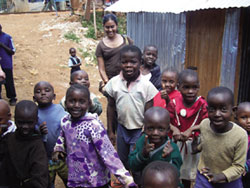Building global community
At the 7th annual World Social Forum, 75,000 people gathered to promote partnerships and build solidarity with movements for change
By Candice Debi
September/October 2007
Return to Table of Contents
Print Article
Kibera stands in sharp contrast to Nairobi's towering business district and million dollar mansions. Upon entering the slum, its local nickname of "no man's land" quickly comes to life, as you are immediately overwhelmed by the clusters of families and children pushed side by side in their makeshift shacks, with only a dirt path used for an outhouse to divide their space. Earlier this year, just outside the rusted tin roof shacks of Kibera, Nairobi hosted the 2007 World Social Forum.
More than 75,000 people from world social movements, coalitions and nongovernmental organizations (NGOs) gathered at Nairobi's Moi International Sports Stadium for the seventh annual World Social Forum, hoping to give a voice to the world's poor. The Forum is an opportunity for participants to make connections and build solidarity in their efforts to create alternatives to the global structures and policies that exacerbate poverty. With 60 percent of Kenyans living on less than a dollar a day, bringing the Forum to African soil was seen by many as a way to deepen the Forum's connection to grassroots development and to stand in solidarity with the plight of some of the world's poorest people.
But the Forum quickly fell guilty to a reality that it struggles against: that of being inaccessible to the poorest. In fact, people like Kennedy Odede, founder of the youth led organization Shining Hope for Community (SHOFCO) based in Kibera, only learned about the Forum by chance when a Catholic priest visiting SHOFCO offered to pay for Odede to attend.
"Kiberans and most of the other poor in the city did not know the Forum was taking place or what significance it had to them," said Odede. But even if they had known, the registration cost of 500 Kenyan Shillings (CDN$7.89) – more than a week's wage for an average Kenyan, was impossible for them to meet.
"When I heard about the World Social Forum, I [thought] this event was only for the big organizations and not for small organizations like SHOFCO, which is run and owned by poor locals. [SHOFCO] is truly a grassroots organization but we were not involved [in the Forum]," said Odede.
Kibera is home to one third of Nairobi's population and is the biggest informal settlement in Africa with close to one million people crammed into a single square mile. Here, generations of families have suffered from poor access to clean water, electricity and education, and perhaps the most psychologically damaging-no permanent housing.

Candice Debi is welcomed by children in Kibera, an impoverished settlement in Nairobi with close to one million inhabitants. Candice was in Nairobi as a youth delegate from the Coady International Institute at the 7th World Social Forum.
Through the work of SHOFCO Odede is trying to bring about change by mobilizing the youth of Kibera through theatre and sports. SHOFCO also publishes a monthly newsletter to educate the community on their basic human rights and to teach them how to start income generating projects. The newsletter helps to create public awareness of the impoverished conditions in Kibera.
"Half of the population of Kibera are youth [and] most youth are idle and jobless. Before [SHOFCO] our youth and their talent were rotting. [SHOFCO] has only been here for one year and it has already made [an impact]. Through our newsletters and theatre we are expressing our ideas, we are highlighting the challenges of the community and empowering our youth," said Odede.
But with only a small empty shed used as their office, Odede's five person led organization has had difficulty obtaining support from larger NGOs and is often ignored by donors. Odede used his opportunity to attend the Forum to connect with a network of organizations, giving him greater access to the resources and tools needed to expand SHOFCO's programs.
After strong protests, the fees to the Forum were eventually waived for all Kenyans but with many local faces not appearing until the very last days, Odede used his presence at the Forum to bring greater awareness about the conditions in Kibera. Through the creation of a series of "Slum Walks", Odede gave Forum participants a guided tour of Kibera and its harsh conditions of poverty while also introducing them to the work of SHOFCO.
Although the tours remained popular throughout the Forum, many participants criticized Odede for encouraging such excursions as tasteless displays of poverty. But for Odede, this was an opportunity to connect with members of established NGOs and create the much-needed linkages with donors to help build SHOFCO. In fact, since the tours, NGOs from the United States and Canada that Odede met through the Forum have sponsored media workshops that provide SHOFCO members with greater resources and skills to write and publish their own newsletters. As well, income from his "Slum Walks" has enabled Odede to provide compensation to the performers of SHOFCO's theatre troupe.
In spite of the Forum's shortcomings, the event helped Odede realize his dream of building a better future for the people living in Kibera. While the problems of Kibera are many, Odede's experience at the World Social Forum has reaffirmed that it is not the actions done on behalf of the underprivileged, but rather the support and solidarity for actions taken by the poor themselves that brings about the greatest empowerment and change.
Candice Debi is a former youth intern with the Coady International Institute of St. Francis Xavier University, Antigonish, Nova Scotia. Through Coady's CIDA funded Youth in Partnership program, Candice spent seven months working in Zambia advocating for the rights of people living with HIV/AIDS. She attended the 2007 World Social Forum as a delegate from the Coady Institute.
Return to Table of Contents
Print Article